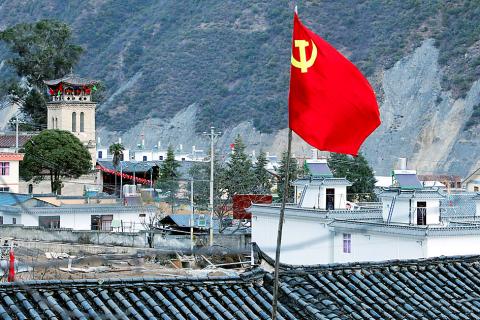The Chinese government in Tibet yesterday said it would boost numbers and cut waiting times for foreign tourists visiting the highly restricted region amid renewed pressure from the US for greater access for officials and journalists.
US President Donald Trump last month signed into law the Reciprocal Access to Tibet Act, which seeks to press China to open the region by denying US entry for officials deemed responsible for restricting access to Tibet.
Beijing denounced the law as interference in China’s internal affairs, risking “serious harm” to ties with Washington.

Photo: Reuters
The Tibetan government is to shorten the time required for foreign tourists to gain access to the region by half and boost numbers by 50 percent, Tibet Autonomous Region Chairman Qizhala (齊扎拉) said in an annual work report published by the official Tibet Daily.
Non-Chinese visitors must apply for a special permit to travel to Tibet, which is usually granted for tourists provided they travel with approved tour companies, but rarely for journalists and diplomats.
Qizhala also pledged that the government would “take a clear-cut stance in the fight against the Dalai clique,” a reference to exiled spiritual leader the Dalai Lama.
“We must improve the monastery management and service mechanisms to defend the bottom line of Tibetan Buddhism not being manipulated by foreign forces,” he said, adding that management of religious activities must prevent another “upsurge” of religion.
Rights groups and overseas activists have said that ethnic Tibetans face widespread restrictions under Chinese rule and the Office of the UN High Commissioner for Human Rights in June last year said that conditions were “fast deteriorating.”
This year marks the 60th anniversary of a Tibetan uprising against Chinese rule in 1959. Supporters of Tibetan independence and the Dalai Lama have in the past staged protests to mark the anniversary, angering China.

NATIONAL SECURITY THREAT: An official said that Guan Guan’s comments had gone beyond the threshold of free speech, as she advocated for the destruction of the ROC China-born media influencer Guan Guan’s (關關) residency permit has been revoked for repeatedly posting pro-China content that threatens national security, the National Immigration Agency said yesterday. Guan Guan has said many controversial things in her videos posted to Douyin (抖音), including “the red flag will soon be painted all over Taiwan” and “Taiwan is an inseparable part of China,” while expressing hope for expedited “reunification.” The agency received multiple reports alleging that Guan Guan had advocated for armed reunification last year. After investigating, the agency last month issued a notice requiring her to appear and account for her actions. Guan Guan appeared as required,

Japan and the Philippines yesterday signed a defense pact that would allow the tax-free provision of ammunition, fuel, food and other necessities when their forces stage joint training to boost deterrence against China’s growing aggression in the region and to bolster their preparation for natural disasters. Japan has faced increasing political, trade and security tensions with China, which was angered by Japanese Prime Minister Sanae Takaichi’s remark that a Chinese attack on Taiwan would be a survival-threatening situation for Japan, triggering a military response. Japan and the Philippines have also had separate territorial conflicts with Beijing in the East and South China

A strong cold air mass is expected to arrive tonight, bringing a change in weather and a drop in temperature, the Central Weather Administration (CWA) said. The coldest time would be early on Thursday morning, with temperatures in some areas dipping as low as 8°C, it said. Daytime highs yesterday were 22°C to 24°C in northern and eastern Taiwan, and about 25°C to 28°C in the central and southern regions, it said. However, nighttime lows would dip to about 15°C to 16°C in central and northern Taiwan as well as the northeast, and 17°C to 19°C elsewhere, it said. Tropical Storm Nokaen, currently

PAPERS, PLEASE: The gang exploited the high value of the passports, selling them at inflated prices to Chinese buyers, who would treat them as ‘invisibility cloaks’ The Yilan District Court has handed four members of a syndicate prison terms ranging from one year and two months to two years and two months for their involvement in a scheme to purchase Taiwanese passports and resell them abroad at a massive markup. A Chinese human smuggling syndicate purchased Taiwanese passports through local criminal networks, exploiting the passports’ visa-free travel privileges to turn a profit of more than 20 times the original price, the court said. Such criminal organizations enable people to impersonate Taiwanese when entering and exiting Taiwan and other countries, undermining social order and the credibility of the nation’s